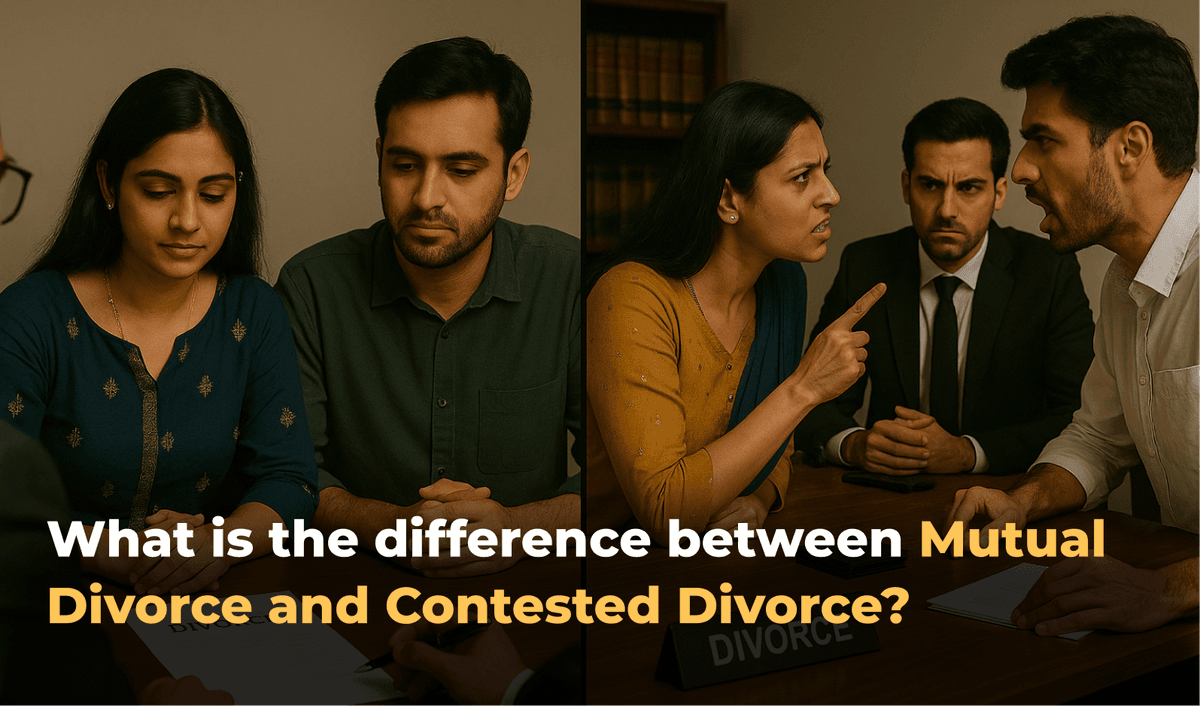What Is the Difference Between Mutual Divorce and Contested Divorce?

Understanding Divorce in India
Divorce can be a challenging and emotional process. In India, there are primarily two types of divorce: mutual divorce and contested divorce. Understanding the differences between them is crucial if you are considering ending your marriage. This blog explains the legal distinctions, processes, and practical guidance to help you make informed decisions. Whether you are seeking legal advice online or planning to consult a divorce lawyer in Delhi, this guide will provide clarity on the subject.
Legal Framework for Divorce in India
India’s divorce laws are primarily governed by:
- Hindu Marriage Act, 1955 (for Hindus, Buddhists, Jains, and Sikhs)
- Special Marriage Act, 1954 (for interfaith marriages)
- Indian Divorce Act, 1869 (for Christians)
- Muslim Personal Law (for Muslims, under personal law)
Divorce can be obtained either by mutual consent or through a contested legal procedure, depending on the circumstances of the marriage breakdown.
What is Mutual Divorce?
Mutual divorce, also known as divorce by mutual consent, occurs when both spouses agree that continuing the marriage is no longer possible. Key features include:
- Consent from both parties: Both husband and wife must agree to the divorce.
- Agreement on terms: Decisions regarding alimony, child custody, and property division are mutually settled.
- Simpler legal process: Since there is no dispute, the court procedure is generally quicker and less stressful.
Legal Process for Mutual Divorce
- Filing the Petition: Either spouse can file a petition for mutual consent in the family court.
- Cooling-off Period: The court typically allows a six-month period (can be waived in some cases) to ensure reconciliation is not possible.
- Final Hearing: If both parties maintain consent, the court grants the divorce.
Example: Ramesh and Priya mutually decided to separate due to irreconcilable differences. They agreed on property division and child custody. Filing a joint petition, their divorce was finalized in less than a year.
What is Contested Divorce?
A contested divorce occurs when one spouse does not agree to the divorce, or there are disputes regarding financial settlements, child custody, or other terms.
- Disagreements are common: Spouses may disagree on alimony, property, or visitation rights.
- Longer legal proceedings: The process can take several months or even years, depending on the complexity of the case.
- Court intervention: A divorce lawyer plays a crucial role in presenting evidence, negotiating settlements, and representing the client.
Legal Process for Contested Divorce
- Filing the Petition: One spouse files a petition citing valid grounds under the respective personal law (e.g., cruelty, desertion, adultery).
- Response from the Other Party: The respondent can agree or contest the claims.
- Mediation/Trial: Courts may suggest mediation first. If disputes persist, trial hearings are conducted.
- Judgment: After evaluating evidence, the court pronounces the divorce and decides on ancillary matters like alimony and custody.
Example: Anita filed a contested divorce citing cruelty. Her husband opposed the petition, leading to multiple hearings. After careful consideration, the court granted the divorce and decided on alimony and custody arrangements.
Key Differences Between Mutual Divorce and Contested Divorce
Feature
Mutual Divorce
Contested Divorce
Consent
Required from both parties
May not be present
Duration
Shorter, typically 6–12 months
Longer, can take years
Court Involvement
Minimal, mainly procedural
Extensive, including evidence and witness examination
Stress Level
Lower
Higher due to disputes
Costs
Relatively lower
Higher due to extended legal proceedings
Practical Guidance When Considering Divorce
- Consult a Divorce Lawyer Early: Speaking to a qualified lawyer in Delhi or online can clarify your options and legal rights.
- Document Financial and Personal Matters: Maintain clear records of assets, income, and any agreements.
- Consider Mediation: Many disputes can be resolved through negotiation or family counseling.
- Understand Your Rights: Awareness of alimony, child custody, and property rights can prevent unfair settlements.
- Stay Calm and Professional: Emotional disputes can complicate legal processes; keeping interactions amicable often helps.
Best Practices for a Smooth Divorce Process
- Maintain transparent communication with your lawyer.
- Keep emotions separate from legal matters.
- Document agreements in writing wherever possible.
- Be aware of Indian divorce laws and local court procedures.
- Seek professional legal advice before making decisions.
Why Choose VakeelSaab for Legal Advice
At VakeelSaab, we provide:
- Expert guidance from experienced divorce lawyers in Delhi
- Legal advice online for convenience and privacy
- Step-by-step support for both mutual and contested divorce cases
- Assistance with court procedures, documentation, and settlements
Contact us today for personalized legal support and ensure your divorce process is handled professionally and compassionately.
FAQs on Mutual and Contested Divorce
Q1: Can mutual divorce be converted into contested divorce? Yes, if one spouse withdraws consent, the process may become contested.
Q2: How long does a mutual divorce take in India? Typically 6–12 months, depending on court schedules and the cooling-off period.
Q3: Are contested divorces more expensive than mutual divorces? Yes, due to longer court hearings, lawyer fees, and complex legal procedures.
Q4: Can a divorce be filed online in India? Yes, initial petitions and consultation can often be done online, but hearings are generally in court.
Related Articles
The Importance of Consulting a Property Lawyer for Real Estate Issues
Blog
How to File a POCSO Complaint in India: Step-by-Step Legal Process
Blog
What punishments does the law give for giving, taking, or asking for dowry?
Blog
Reasons for the Increasing Divorce Rates in India
Blog
What is a Special Leave Petition? Meaning, Features, Process & & Who Can File?
Blog
What is Domestic Violence and What Are Its Types, Causes, and Effects?
Blog